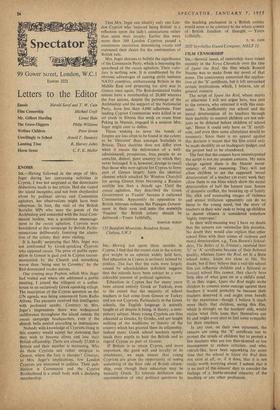FILM CENSORSHIP
SIR,—Several issues of censorship were raised recently in the News Chronicle over the fate of Spare the Rod, the film which Ronald Neaine was to make from my novel of that name. The controversy concerned the applica- tion of the 'X' certificate, but it left untouched certain implications which, I believe, are of general concern.
The script of Spare the Rod, whose merits or otherwise I will not argue here, was sent to the censors, who returned it with this com- ment : 'An.. inefficiently run school and the moral deterioration of its teachers through their inability to control children are not sub- jects to be debated before children of school age.' Hence it could only have an 'X' certifi- cate, and even then some alterations would be necessary, Since there is no appeal against this decision it meant that the film could only be made shoddily on an inadequate budget, and the project had to be abandoned.
The fact that the censors have misinterpreted the script is not my present concern. My main charge against them is the blatant incori- sistency of their reasoning. They will not allow children to see the supposed 'moral deterioration' of a teacher yet every week they allow them to see films which show the moral deterioration of half the human race. Scenes of domestic conflict, the breaking up of family life, slick and nauseating images of violence and sexual titillation apparently can do no harm to the young mind, but the story of teachers at their wits' ends to bring up children as decent citizens is considered somehow 'highly improper.'
In their well-meaning way I have no doubt that the censors can rationalise this paradox. No doubt they would also explain that other school films with their scenes of violence and moral deterioration, e.g., Tom Brown's School- days, The Belles of St. Trinian's, received their 'U' or 'A' certificates because of their fictional quality, whereas Spare the Rod, set in a State school today, keeps too close to life. No doubt; but if they believe that a real-life school film can influence children and a fictional or farcical school film cannot, they clearly have little idea of what goes on in a child's mind. If, as they argue, Spare the Rod might incite children to commit some outrage against their teachers it would probably be because their teachers deserved it and might even benefit by the experience—though I believe it much
more likely that children, seeing this film, which is strongly on the teachers' side, would realise what little louts they themselves can be and might even start to feel some sympathy for their teachers, In any case, on their own statement, the censors are using the 'X' certificate not to protect the minds of children but to protect a few teachers who arc too thin-skinned or too incompetent to endure criticism, and who.
ostrich-like, have been squawking for some
time that the school in Spare the Rod does not exist at all, or, if it does, that it is not
Since the publicity over this film I have been approached by two independent producers. The censorship has horn fruit; one producer would like to make the film as a 'quickie' with 'a good scx angle,' viz., between the young teacher and a girl pupil, so that it could be sold as 'the SeXiest school film ever'; the other producer would like to use the title but rewrite the story so that it would be surc, of an 'A' certificate. To these suggestions I have made the obvious reply.
It may seem from these remarks that I have a chip on my shoulder; and indeed I have. But, apart from any material loss, it has been to me an utterly depressing experience to have con- firmed what before I had only suspected, that in this country, in this day and age, it is impossible to make a film which contains any serious criticism of authority. — Yours faithfully, 20 Druce Road, S.E.21
MICHAEL CROFT















































 Previous page
Previous page